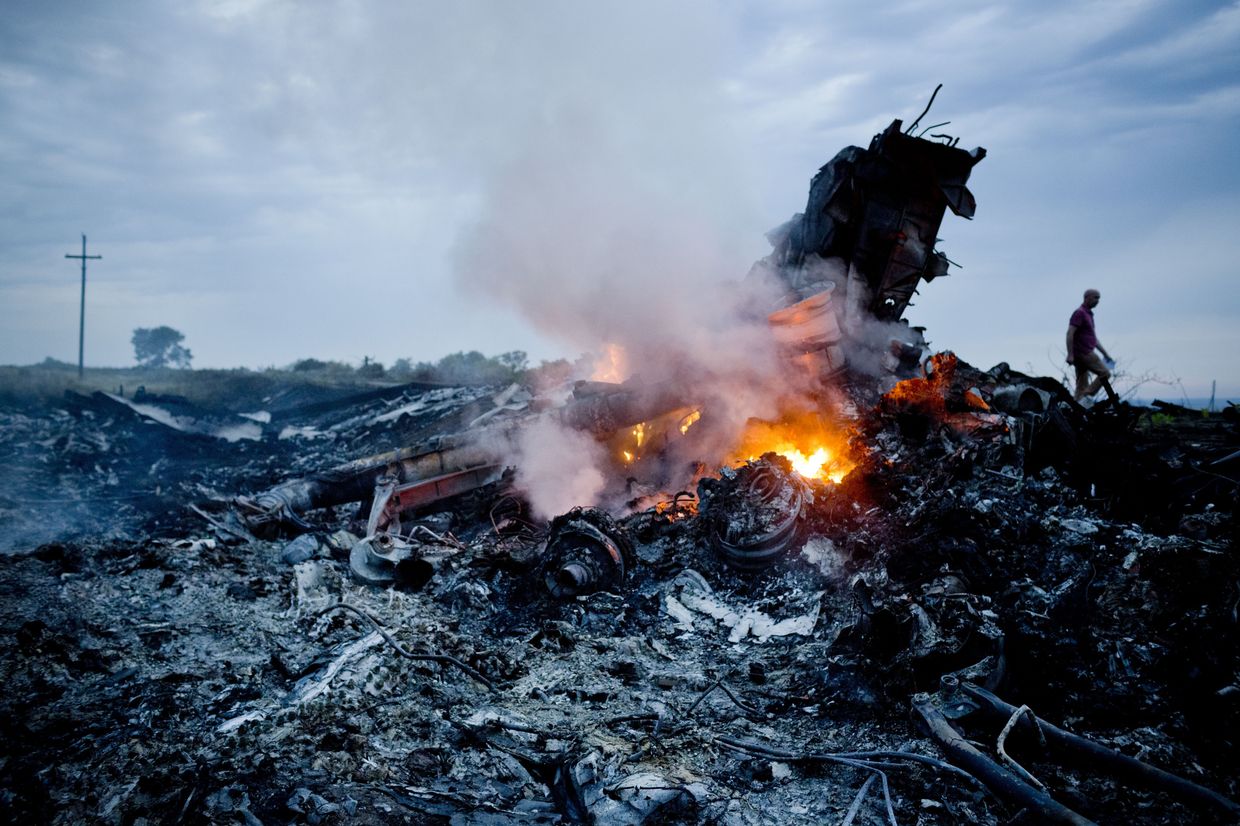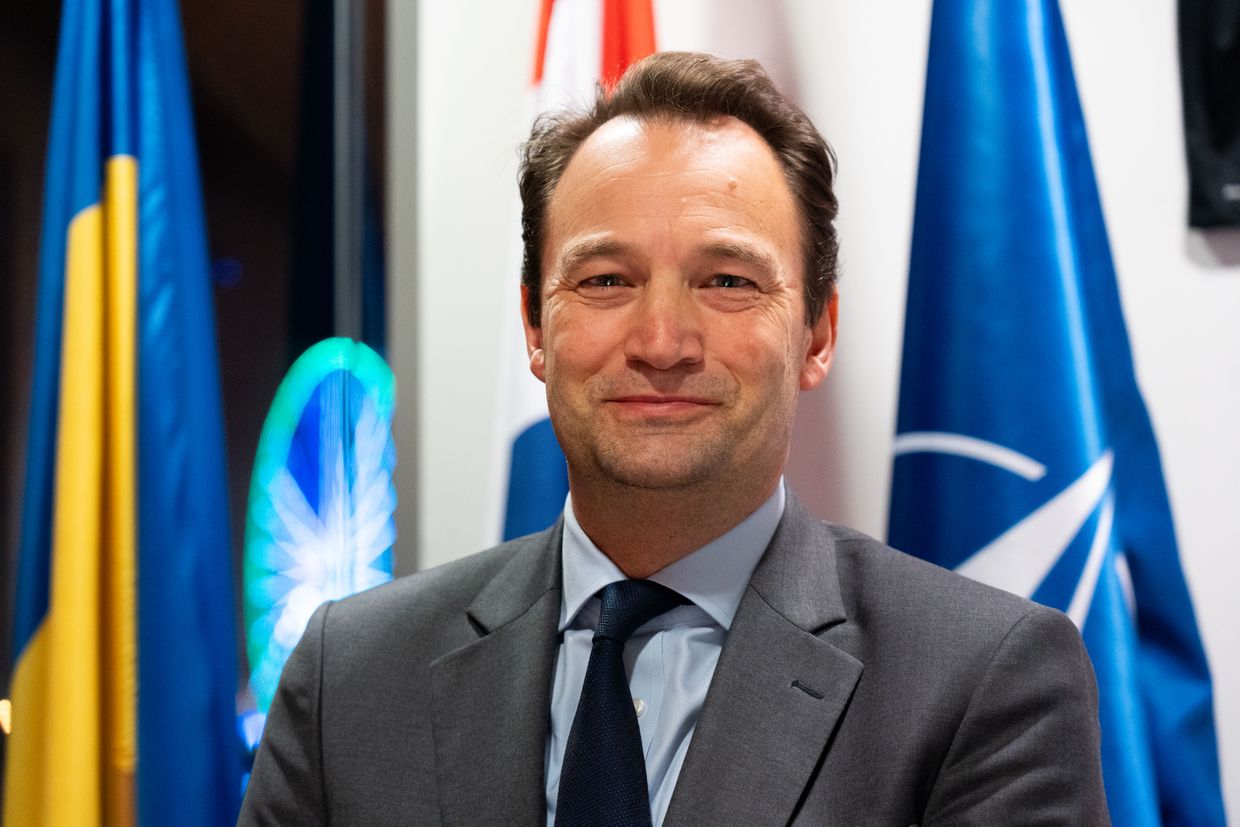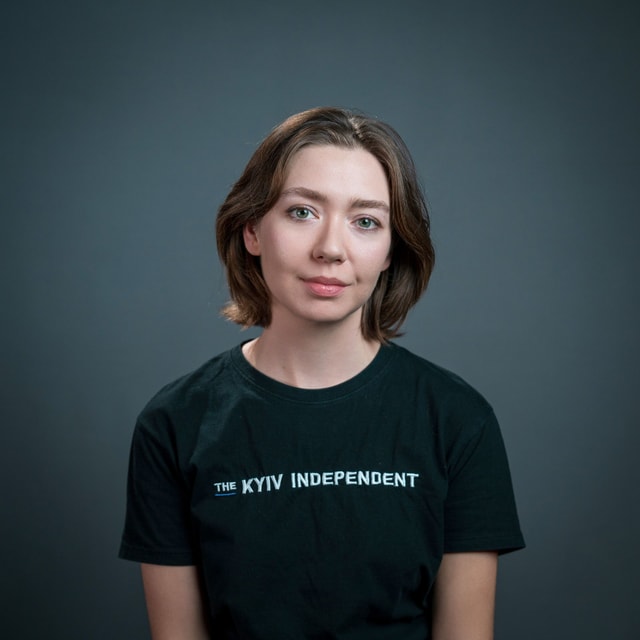Dutch ambassador to Kyiv on F-16s, MH17, and Scythian gold – 'Ukraine is fighting not only for itself but also for us'

Dutch Ambassador to Ukraine Jennes de Mol during an interview with the Kyiv Independent at the Embassy of the Kingdom of the Netherlands in Kyiv, Ukraine, on July 15, 2024. (Oleh Tymoshenko / The Kyiv Independent)
The recent career of the outgoing Dutch Ambassador, Jennes de Mol, has been a good reflection of his country's relations with Ukraine.
A career diplomat, De Mol was the Dutch Consul General in Saint Petersburg in 2014, when he came to Kyiv to assist the Dutch embassy in the aftermath of Russia's downing of the Malaysia Airlines Flight 17 on July 17, 2014, over the Russian-occupied part of eastern Ukraine.
When arriving in Kyiv in the summer of 2019 to take up his post as Dutch ambassador to Ukraine, a full-scale war with Russia was a distant idea. The Hague's relations with Kyiv had been soured by the non-binding 2016 Dutch Ukraine–European Union Association Agreement referendum, which had a low turnout but saw a majority of voters voting against.
Over the course of Russia's full-scale invasion, however, the Netherlands emerged as one of Europe's staunchest supporters of Ukraine, becoming the fifth largest military aid supplier and leading the coalition to train and provide Ukraine with the modern F-16 fighter jets.
A week before departing Kyiv for his new posting as ambassador to Poland, de Mol sat down with the Kyiv Independent to discuss the provision of F-16 jets, Russia's war against Ukraine, and how to bring Russian perpetrators to justice.
The Kyiv Independent: A week ago, there was another attack on Kyiv, which targeted the Okhmatdyt children's hospital, among other civilian targets. What was your message to the Dutch government after your visit to the site of the attack?
Jennes de Mol: First of all, it was horrific. It was a strange weekend, we had a visit from the new Dutch defense and foreign ministers. On the first day, we visited Kyiv, and then we went to Odesa. On the way back on Monday morning, we received information that something had happened in Kyiv.
We sent a message to the Netherlands that this was really a horrific act, a barbaric act, and that it was a new low.

It also had an impact on the population of Kyiv because we have this idea that we are relatively safe and that the air defense works. All of a sudden, this becomes very fragile, and we are not as well protected as we had hoped. We're vulnerable.
I noticed that there was actually this sort of mist around all of us, for the first three or four days, which I really felt. I really felt that we had collectively gotten a blow on the head. This is what I tried to convey to the Netherlands. It shows the need for air defense.
You mention the visit of the new ministers. In 2016, the Dutch held a highly politicized referendum on Ukraine's association agreement with the EU. Now, the Netherlands has remained stable in terms of its support for Ukraine, even though you now have a new government. Why has support for Ukraine remained high now?
The referendum was very much about ourselves, about European enlargement, and about dissatisfaction with the government. The turnout was very low, but it managed to reach the threshold of 30%, and the outcome was negative. At the end of the day, our prime minister (Mark Rutte) managed to find a way to sign, but with an addendum inside the agreement.
The situation in 2022 was different in the sense that it was so obvious that this was an unprovoked aggression from the Russian Federation towards Ukraine, and there was no option but to provide support.
In 2022, we understood that if we do not support Ukraine and Ukraine falls, then we also have a major security risk for ourselves, because it will not stop.
That understanding was already there and the rhetoric that built up in 2021 was such that people (in the Netherlands) were getting very concerned. The Netherlands is, I would say, a pragmatic country and it gives support in a pragmatic way. We are a country of less words, more deeds.
The leadership of our prime minister (Mark Rutte) was crucial. He decided, with the government, to support Ukraine. Starting with helmets and basic things, it gradually became more urgent to provide support that really makes a difference – whether that is Panzerhaubitze, the tank coalition, F-16s, or Patriot systems.
What we had, we gave. What we could not give, we tried to buy. And what we could not buy or arrange ourselves, we tried to do that in a coalition with diplomatic support. That is actually how it works up until today.

Dutch Ambassador to Ukraine Jennes de Mol. (Oleh Tymoshenko / The Kyiv Independent)
We use all our diplomatic instruments to make coalitions with partners to support Ukraine. We understand that Ukraine is fighting a fight not only for itself but also for us.
This war is about democracy, freedom, and rule of law, and international world order – crucial things for the Netherlands. This is why the new government continues this support for Ukraine, because this is essential for us as well.
Flight MH17 was downed over Ukraine ten years ago on July 17, killing 298 civilians, among them 196 Dutch nationals. The trial that concluded at The Hague district court in November 2022 declared three people – two Russians and one Ukrainian proxy fighter – guilty in absentia. Do you have any hope that these people will serve their sentences in the Netherlands?
One is in prison in Russia, (Igor) Girkin, but not for this reason. Of course, there's the hope that one day they will end up in jail in The Hague. When it will happen, I don't know. (The imprisonment in The Hague of Serbian President Slobodan) Milosevic, we also didn't expect, but it happened.
So you never know. We are committed and we will leave no stone unturned to make sure that we do everything in our possibilities to get this done. So whenever we have the opportunity, we will do so.
In terms of F-16s, which are soon to arrive, do you have any expectations on how Ukraine will use these jets, and in what way they could change the situation here?
I'm not a military person, so I don't know. I know that everybody is waiting for the F-16s to fly. But it's a very complicated piece of equipment.
You need to have the logistics in place, the pilots need to be trained, you have to have the armaments and the security, and the airfields have to be adjusted. It's a complex issue. And I know that Ukraine has no time – it wants things to be fast. Of course, we understand that.
The F-16s will make a difference, but exactly how and when, I cannot tell you. First of all, because I'm not an expert. Secondly, even if I knew, I would not tell you, because it is not in the interest of Ukraine to be very open about this. Some things you just don't talk about.

There has been news in the last couple of weeks that Russia has been specifically targeting airfields in Ukraine, potentially in light of the arrival of F-16s. Is the protection of airfields being discussed among Ukraine's European partners?
I cannot comment on this, of course. This is very much up to the Ukrainian military, and they discuss these issues with their military partners but not with me.
You mentioned you originally studied archeology and law. After 10 years of limbo and legal disputes, the Scythian gold from Crimea that was on loan to an Amsterdam museum in 2014 has been returned to Ukraine. How does this feel, both as a diplomat and as an archaeologist?
Well, first of all, I remember visiting the Allard Pierson Museum in Amsterdam where Scythian artifacts were being exhibited and I spoke to the director at that time – and then, the whole story of these court cases, it was very difficult.
We have an independent judiciary and rule of law. At the end of the day, it took a long time, but justice prevailed. It was decided that the artifacts had to be returned to the rightful owner. And that is Ukraine.
I was happy with the outcome, but it also showed the independence of our legal system. Sometimes I get thanked for this, but I shouldn't be thanked. It's actually thanks to our independent judicial system that came to this conclusion.
The exhibition that opened recently in Kyiv is nicely done and shows the richness of the cultural diversity of Crimea. And of course, the next step is the return of Crimea to Ukraine.
This war is about identity, culture, language, and history. They want to wipe you out. Today, we are having this interview on the day of Ukrainian Statehood (July 15). This morning I was at the Saint Sophia Cathedral, and I really felt when I heard the choir sing, and I saw the religious leaders and your government, that Ukraine is a part of a thousand years of culture, statehood, and tradition.
When you leave Ukraine, how do you deal with the feeling of war fatigue and that in the West, the war has become normalized?
The war has been going on for 10 years, and the full-scale invasion for two and a half years. We felt the impact in the Netherlands in terms of energy prices rising and how there are now 120,000 Ukrainians around us. They have integrated easily into our society, but they belong to Ukraine.
People understand the reality of the situation, but the sense of urgency is less. Here you feel the pressure and you see the events in the east, or news of attacks in places like Kharkiv or Dnipro. The Netherlands is only 1,500 kilometers away from Ukraine, but the sense of urgency is less.
I try to counter this by giving a lot of interviews. Normally, ambassadors are a bit reluctant to appear in the media, and we try to do our work behind the scenes. It's for the politicians to give the interviews. But I try to tell the story of Ukraine and how the war has touched every single household in Ukraine.

If you travel to the Lychakiv cemetery in Lviv, you see thousands of flags of warriors who have died. That means thousands of families. I try to communicate about what I see happening here and why it is important that we continue to provide support.
I also try to do that with my own social media or by taking the opportunity to speak on Dutch television. I talk about Ukraine also because there is competition – there is the Middle East, or things happening in the U.S.. But the story of Ukraine should continue to be told.
I always say this: We live on Europe Street. We live at number 30. At number 32, we have a good neighbor. At number 34, there is a neighbor whose house is ablaze – this is Ukraine. At number 36, there is an arsonist who needs to be taken away. The fire needs to be put out at number 34, while number 32 needs to be kept wet, and number 30 needs to be very active. I cannot explain the reality of Europe in more simple terms to Dutch audiences.
Your next posting will be in Warsaw. What lessons that have you learned in Ukraine will you take with you to Poland?
As a diplomat, I always have to keep a little bit of distance from the country where I am located, but I went through so many emotions here. Two and a half years of full-fledged war. Years of war before that. I saw a lot of suffering but also bright, brilliant, committed people.
The reality is, I became a little bit Ukrainian. I will leave Ukraine but Ukraine will not leave me – it has become a bit part of my life, and also of my system. This is what I'll take to Poland, which is a very interesting country. There are a lot of Ukrainians living there and Poland is very active when it comes to Ukraine.
In Poland, I will also be responsible for politics towards Belarus. There are a lot of economic and agricultural relations between Poland and the Netherlands, as well as relations in terms of security within NATO and the EU. The position of Poland has changed over time as a result of the events in Ukraine. So, it will be interesting to be in Poland, but it will also give me the opportunity to continue to be involved in Ukraine.












